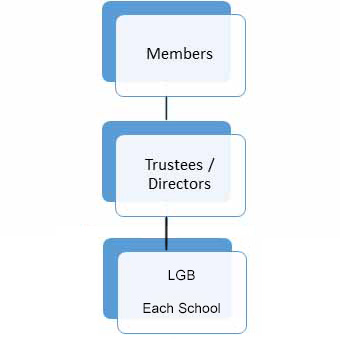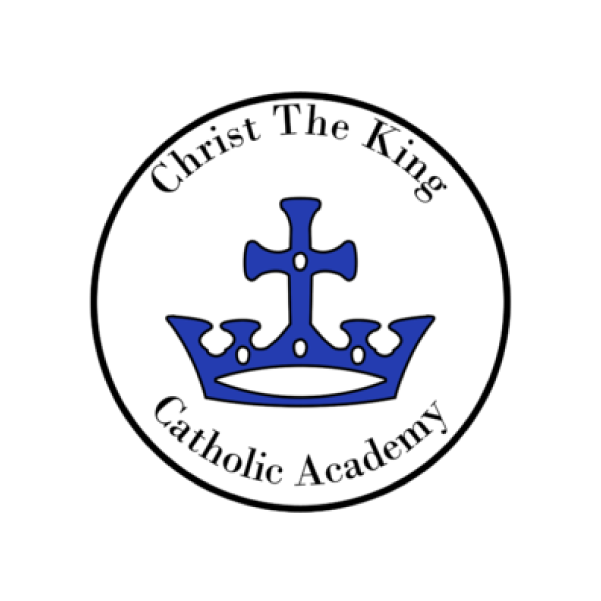Most academies have local governing bodies (LGBs) made up of different types of governors. All Catholic academies are made up of Foundation Governors (Catholics who are appointed by the Bishop) and may also include parent governors, staff governors, the head teacher and sometimes, co-opted governors.

The Trust governance model consists of Members, Trust Board/Directors and local governing bodies. The Members are appointed by the Bishop of Lancaster and the Diocese has ultimate control over the academy trust, with the ability to appoint the majority of the trustees (Foundation Directors) and the right to amend the trust’s articles of association. The members of BEBCMAT are the Bishop of Lancaster (Bishop Paul Swarbrick), the Episcopal Vicar for Education and Formation, Fr Michael Doherty, and the Diocesan Board of Education Trustees.
Academy trustees/directors: The directors are responsible for the same three core governance functions performed by the governing body in a maintained school: setting the direction, holding the headteacher (the leadership of the organisation) to account and ensuring financial probity. As charity trustees, they must also ensure that they are complying with charity law requirements.
Local governors: Individuals who sit on local governing bodies (LGBs) are referred to as ‘local governors’. This is because the directors can delegate governance functions to the local level. Subject to the restrictions in the articles of association and any guidance issued by the Archdiocese, the directors have discretion over what is delegated to each LGB. They may, for example, decide to delegate all functions to academies in the trust that are performing well and fewer to those academies that need greater support. The details of what has been delegated from the directors to local governors will be detailed in the scheme of delegation for the Trust. This will make it clear what responsibilities are retained by the board of directors of the trust (the Trust Board) and what responsibilities are to be given to each Local Governing Body.
Key Responsibilities: The Local Governing Body will be responsible for the Catholic Life of the academy, day to day oversight of the management of the academy and compliance with the Trust and the academy’s policies and practices, standards, and ensuring the academy fulfils its responsibilities to pupils and their families, being at the heart of the relationship between the school and its local parish community. The Trust Board will determine the strategy for the Trust, secure school improvement and academy turnaround overseeing performance and standards, ensure good practice holding leadership to account. The Trust Board will be supported by an Executive Team led by the Chief Executive Officer.
Purpose
The role of the local governing body in a multi academy trust is a valuable one in providing local governance as well as offering assistance to the Trustees/Directors in fulfilling their responsibilities. The purpose of the LGB is to provide focused governance for an academy at the local level. It should also monitor the academy’s key performance indicators and act as support and challenge to the Headteacher. The LGB will also play an important role in representing the views of the academy stakeholders. The specific functions of the LBG are clearly laid out in the Trust’s scheme of delegation.
Local Governors contribute to the work of the Local Governing Body in ensuring high standards of achievement for all children and young people in the academy by:
- Supporting the academy’s vision, ethos and strategic direction in line with that of the Academy Trust
- Supporting and challenging leaders on the educational performance of the academy and its pupils, and their well-being and safety
List of Local Governing Bodies in the Trust

Christ The King Catholic Academy & St. Cuthbert's Catholic Academy LGB
Chair of Governors: Julie McLeod

Sacred Heart Catholic Primary School LGB
Chair of Governors: Mr. R. Clegg

St. Kentigern's Catholic Primary School LGB
Chair of Governors: Mrs. Maura Leyland

St. Mary's Catholic Academy, Blackpool LGB
Chair of Governors: Mrs. Michelle Staveley

St. Mary's Catholic Primary School, Great Eccleston LGB
Chair of Governors: Mrs. Maura Leyland

St. Teresa's Catholic Primary School LGB
Chair of Governors: Cyril Holland

St. Wulstan's & St. Edmund's Catholic Academy LGB
Chair of Governors: Mrs. Maria Doherty
Vacancies
We are currently looking for suitable people to become foundation governors. This is an unpaid role, but a great opportunity to contribute to the wider community and develop valuable skills, such as leadership, team work, communication and enhance your CV and experience.
Are you looking for a way to live out your faith and serve your local community at the same time? If so, becoming a Foundation Governor could be just the thing for you. Foundation Governors play an important part in maintaining and developing the Catholic character of these schools.
Please contact the Head Teacher at the school if you would like to know any more about what being a governor involves.
Foundation Governors agree
- to ensure that your school is conducted in accordance with the Trust Deed,
- to know and implement the Bishop’s policies on education, and
- to understand and promote the distinctive nature of Catholic education.
They are therefore responsible for understanding, maintaining and developing the distinctive nature of the Catholic school within the Church’s mission of education in awareness of the contribution the Church makes to society through this mission.
All Governors are able to contribute their rich experience, values and views to enhance and promote the school’s ethos and vision.
Real and exciting opportunities exist for regular discussion and debate across numerous aspects of school life and provision. Being a Governor affords you the opportunity of collaborating with a wide range of colleagues to ensure all children and young people receive enjoyable and developmental learning experiences within a Christ-centred environment. The governing body plays a key strategic role in the direction of and accountability for the school, but is also part of a network of relationships which includes children and young people, parents, staff, priests, religious, the Diocese, Local Authority, DfE, and the wider community.
In the Diocese of Lancaster, the Education Service is responsible for offering training as well as support and care to catholic schools in the Diocese. The Education Service also liaises with Local Authorities throughout the Diocese and the Catholic Education Service based in London.
Foundation Governors
Foundation Governors in Voluntary Aided and Academy Catholic schools are appointed by the Bishop as his representatives on the Governing Body.
They ensure that the school preserves its particular religious character and that it is conducted in accordance with the terms of the school’s trust deed.
Foundation Governors are appointed for a term of four years.
Other Governor categories:
Parent Governors
Staff Governors
Co-opted Governors
A Headteacher Governor
Governors come from all different backgrounds, it is important that each governing body has agood mix of skills, knowledge and experiences.
Because not all governing bodies need the same skills to be successful, it is vital that individuals from all backgrounds volunteer to be a Foundation Governor.
Any practising Catholic over the age of 18 can become a Foundation Governor (unless they area member of staff at the school or closely related to any member of staff). A reference from your Parish Priest will be taken up as part of the application process.
There is no magic formula about what makes a perfect Foundation Governor, they come from all walks of life and all ages. But it is important that each governing body has a good mix of skills, knowledge and experience.
Foundation Governors are appointed by the Bishop specifically to preserve and develop the Catholic ethos of the school and represent the Bishop’s education policy (e.g. worship and Religious Education) to the Governing Body.
This is why Foundation Governors will always outnumber other governors.
Yes! Whilst you cannot serve as a Foundation Governor, you may be a Parent Governor or could be appointed in the role of Co-opted Governor. All these Governors are appointed through the school, not by the Diocese.
Governors need to be able to commit interest, enthusiasm and time to the tasks that being a governor brings. You will find that the role of a Foundation Governor brings personal reward and satisfaction, although it does mean that you must be prepared to give some time to the work.